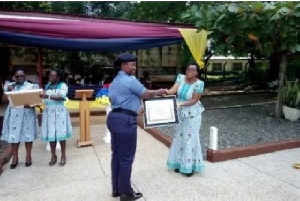 Awards were given to some nurses during the 37 Military Hospital's Nightingale week celebration
Awards were given to some nurses during the 37 Military Hospital's Nightingale week celebration
Health Institutions have been tasked to revisit the practice of training more community nurses to visit various homes, work places and schools to promote preventive diseases as well as good environmental practices.
Government has also been urged to empower these nurses with the needed resources so that they could discharge their community work effectively in order to prevent the outbreak of diseases.
Dr. Florence Naab, a Senior Lecturer at the University of Ghana, School of Nursing, made the call at the 37 Military Hospital Nightingale week celebration held in Accra.
The occasion was also used to award serving and retired personnel of the hospital.
The celebration is under the theme: “Combating environmental degradation towards achieving Sustainable Development Goals (SDG’s) with other stakeholders.”
Dr Naab noted that during nurses’ strike at the Pantang Hospital, people through the media, rained insults on the nurses, questioning whether nursing had anything to do with land issues.
Dr Naab said nurses need a suitable and balanced environment to work in order to save lives.
According to her, nurses were good allies that could champion the effects of environmental degradation by preaching attitudinal change to save the environment.
The Senior lecturer of the University of Ghana, School of Nursing, noted that, currently, Ghanaians do not see anything wrong with littering and so they were littering with impunity.
“It would therefore require that our nurses team up with some environmentally friendly non-governmental organisations to preach attitudinal change among our populace to save the environment.
She was not happy with the rampant destruction of the environment, citing air pollution and littering, as major contributory factor.
Dr Naab said attitudinal change was the primary solution to combating environmental degradation adding that, “if we change our attitudes we can stop the pollution.”
She appealed to the public to desist from defending bad attitudes and take care of the environment in order to preserve lives and reduce work load on nurses in the various hospitals.
Dr Naab observed that the 17 points of the SDG’s were all linked to the environment and urged all to take a critical look at them.
She appealed to the nurses to take part in leadership positions in their communities, departments, constituencies and units so that they could ensure behavioural change, in terms of decision making.
Brigadier General Ralph K. Nametape, Director General, Medical Services of the Ghana Armed Forces noted that, the commencement of “Operation Vanguard” indicated that the environment was being destroyed.
Brigadier General Ametepi paid glowing tribute to the gallant men and women who have served the hospital in diverse ways.
He was however not enthused with the poor work ethics, which he said, was worrying and told the nurses that “there is more room for improvement.”
Mr Kumi Kyeremeh, a Retired Director of Nursing and Midwifery, Ministry of Health, stressed the need for nurses to strive to maintain standards in their profession.
Serving and retired personnel who distinguished themselves were given plagues.